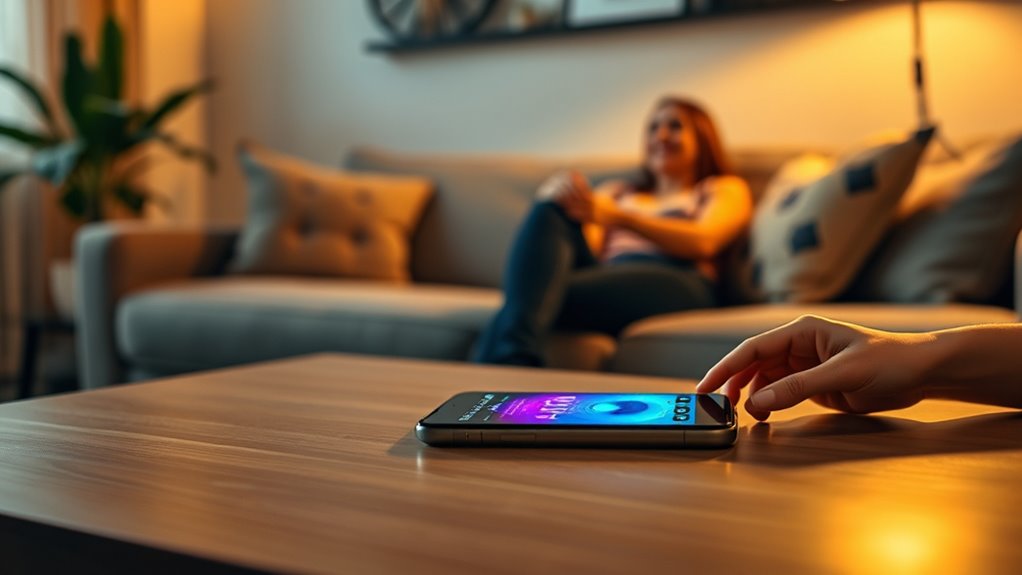AI-powered mental health coaches in your pocket offer personalized support and real-time insights whenever you need them. These compact tools can analyze your behaviors, emotions, and patterns to tailor guidance and coping strategies. They provide accessible therapy options, reduce stigma, and help you manage anxiety or stress actively. With 24/7 availability and safe, non-judgmental spaces, they make mental health support more flexible. Keep exploring to discover how these digital helpers can truly transform your well-being.
Key Takeaways
- AI-powered mental health coaches offer 24/7 personalized support through chatbots and digital companions.
- They analyze user data to provide tailored coping strategies and emotional insights.
- Virtual reality features enable immersive therapy sessions and relaxation techniques on demand.
- These tools help reduce stigma and encourage help-seeking by offering safe, non-judgmental environments.
- They supplement traditional therapy, improving access and early intervention for mental health concerns.

Have you ever wondered how artificial intelligence is transforming mental health care? Today, AI-driven tools are revolutionizing how you access support, making mental health resources more personalized, immediate, and accessible than ever before. The global market for AI in mental health has grown substantially, from about US$1.45 billion in 2024 to US$1.8 billion in 2025, and is projected to skyrocket to nearly US$12 billion by 2034. This rapid expansion reflects the technology’s increasing role in addressing mental health conditions such as psychosocial disabilities, impairments in functioning, and risks of self-harm. AI isn’t just supporting diagnoses; it’s shaping treatment strategies that are more tailored to your unique needs, predicting issues early and helping prevent crises before they escalate.
AI is transforming mental health care with personalized, accessible tools, predicting issues early and shaping tailored treatment strategies.
One of the most exciting developments is AI’s ability to personalize and predict mental health outcomes. By analyzing your individual data, AI tools customize treatment plans that adapt dynamically to your progress. For example, through predictive analytics, AI can identify signs of mental health issues well before symptoms become severe, enabling early intervention. Virtual reality integrated with AI further enhances therapy by providing immersive experiences that support exposure therapy and relaxation techniques. These innovations ensure your treatment is more effective because it evolves with you, improving engagement and outcomes.
AI’s influence extends into training mental health professionals as well. It acts as a coaching tool, offering real-time feedback during therapy sessions and highlighting areas where therapists might improve or overlook. Simulation-based learning with AI-powered avatars allows clinicians to practice and refine their skills in controlled environments, ultimately improving the quality of care you receive. Although some ethical concerns and initial hesitancy exist, AI’s role in training helps address workforce shortages by making therapist education more scalable and consistent.
Beyond supporting professionals, AI provides ongoing assistance directly to you. Hybrid models combine traditional therapy with AI tools, like chatbots and digital companions, offering continuous support outside of scheduled sessions. These AI assistants are available 24/7, giving you a reliable resource whenever you need it. They analyze large datasets to uncover hidden patterns in your behavior and emotional states, helping your therapist understand you better and tailor treatment plans accordingly. This hybrid approach improves communication, boosts engagement, and ensures you don’t have to wait for your next appointment to get help.
AI chatbots and virtual companions are especially useful in reducing stigma and encouraging help-seeking. They provide a safe, non-judgmental space for managing anxieties, practicing conversations, or simply venting. Platforms like Clare&me in Germany or Limbic Care in the UK offer around-the-clock AI therapy companions for underserved populations. They monitor your emotional well-being and connect you to human support if necessary. Early evidence shows these tools successfully foster help-seeking behaviors, making mental health care more approachable and inclusive. With AI in your pocket, mental health support becomes more immediate, personalized, and accessible than ever before.
Frequently Asked Questions
How Do AI Mental Health Coaches Ensure User Privacy?
You might wonder how AI mental health coaches protect your privacy. They guarantee this by presenting clear terms and privacy policies upfront, using simple language to explain data handling. They limit data collection to what’s necessary, encrypt communications, and allow you to delete your data. Many follow strict regulations like GDPR and HIPAA, and avoid sharing your info with third parties, maintaining your confidentiality and control over personal information.
Can AI Coaches Replace Human Therapists Entirely?
You might wonder if AI coaches could fully replace human therapists. While AI can support your goals, offer consistency, and be more accessible, it can’t replicate the deep emotional connection, empathy, or nuanced understanding a human provides. Human therapists excel in reading non-verbal cues, adjusting treatments, and handling complex emotional issues. So, AI is best as a helpful supplement, not a complete replacement for the personalized care only humans can give.
What Qualifications Do AI Mental Health Tools Have?
Some might worry about AI tools lacking human qualifications, but these systems are built on rigorous scientific research and validated through clinical trials. You can trust that AI mental health tools are developed with input from licensed psychologists and mental health experts, ensuring they meet high standards. They also adhere to ethical guidelines, prioritize user safety, and are regularly evaluated for accuracy, making them a credible support option in your mental health journey.
How Effective Are AI Coaches for Severe Mental Health Issues?
You wonder how effective AI coaches are for severe mental health issues. While they can help with mild to moderate symptoms, they aren’t a substitute for professional care in serious cases. AI tools can support early detection and offer some relief, but they lack the nuanced understanding needed for complex disorders. For severe issues, you should seek help from qualified clinicians, as AI alone isn’t enough for all-encompassing treatment.
Are AI Mental Health Apps Accessible to Diverse Populations?
You might wonder if AI mental health apps reach diverse populations. They do, markedly improving access for underserved groups by offering anonymous, culturally sensitive support that reduces stigma and logistical barriers. AI tools have boosted referrals among minorities and non-binary individuals. While effective in increasing engagement, make sure you remain aware of privacy concerns and the need for culturally tailored, secure solutions to truly benefit all users.
Conclusion
Imagine having a mental health coach right in your pocket, ready whenever you need support. But as AI technology advances, questions about its true effectiveness and safety grow louder. Will these virtual coaches become your trusted allies or just another fleeting trend? The future of mental health care is unfolding before your eyes—are you prepared to see what’s next? Stay tuned, because what’s coming might just surprise you.










